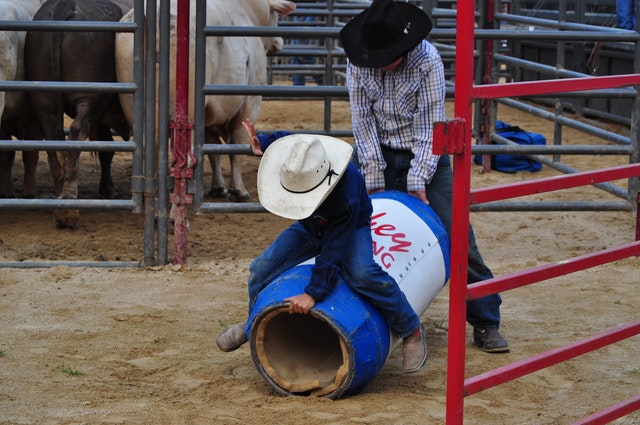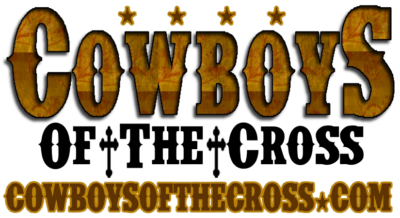
We can’t take words or advice at face value, from bull riding to Biblical instruction
By Will Brunke / Special to Cowboys of the Cross
One of my most consistently used metaphors is that “bull riding emulates life and life emulates bull riding”. Likening the unique struggles and confrontations of life that are so often imitated on a minute scale in a sporting event is nothing new. So, it came as a shock and with some disappointment in myself when I was hit in the teeth with an epiphany that seemed so obviously clear, considering my love and probable over-use of metaphors.
Teaching a bull riding clinic of young men and young boys on a cool weekend this fall, I settled into a gamut of trick questions in order to open up the riders ‘ thought processes and to give them examples of easy pitfalls that inexperienced riders can get bogged down in. The premise was simple; be careful of the words that are tossed around the bucking chutes and how you apply them.
For example; a person may have the best of intentions when they are supporting you as you ride, all the while screaming at you, “REACH!!! REACH for the front!!” In reality, this is probably some of the worst advice you can get and can dramatically increase your chances of an early buck-off as well as your chances for an injury. There is almost nothing about “reaching” in bull riding that is mechanically sound. Riders who learn a bad habit such as this tend to hit a brick wall in their riding that they can never seem to get around. The point I was trying to express to the group was that it is imperative that you understand what words mean for better or worse. How many of us take words and advice at face value without using our critical thinking to analyze and evaluate possible outcomes? At this point, in jest, I banned the word “reach” from the rest of the clinic. But what was more important is that I inserted a new vocabulary in place of the flawed one — this time with meaning.
In short, after some constructive conversation, open dialog, and some examples and drills on the barrels, an overwhelming look of exuberance began to appear from most of the group. They got it. They were now hungry for more and fully engaged after having a proverbial blindfold removed. The spoon-fed were now feeling like hunters after the realizations had past that not only did this new way make sense, but its truths cleared the thorny underbrush away and created a template that the riders could gauge their technique and future advices against. The words in the Bible are like this for many.
In the Gospel of John, Jesus was telling those who began following him, and those who were trying to discredit them that his true followers would follow his teaching and not that of the religious elite that were using their position to hold power over people. John 5: 31-32 To the Jews who had believed him, Jesus said, “If you hold to my teaching, you are really my disciples. 32 Then you will know the truth, and the truth will set you free.”
The words of scripture can be an emancipator, setting you free. Used incorrectly the words can become an enslaver. One person can lead or mislead many out of the truest intentions depending on the level of understanding the teacher possesses and the level of spoon-fedness to which the audience may be inclined. Unfortunately, some are even led by false teachers with impure intentions. How is this possible? I believe an old bull riding adage can apply; The top 20% of riders haul in 80% of the prize money. Which means 80% of bull riders are struggling with the sport and, more often than not, donators to the purse. I believe the same is true on a more Christian front; 20% of Christians are hunters of the truth and can easily disseminate false teachings from Gospel truth. However, that means that 80% of Christians are struggling with scripture, have a loose grasp of the Gospel and are easily swayed toward the fringes where words and phrases like, “prosperity”, “morally good”, or “you’re perfect just the way you are”, run rampant and the generalized vagueness of salvation are currently leading many to despair.
I feel blessed to take a moment and think about some of my closest friends in my life and realize that they are also hunters of the truth who hold me accountable, ask tough questions, and point indiscriminately to scripture. These people are my trusted traveling partners in my walk with Christ. But just like at the bull riding clinic, I believe my friends and I have a great template to measure ourselves and our technique against. It’s the teachings from Jesus himself. Everything in the Bible from beginning to end points toward Him. During Jesus’ time on earth, he spoke only truths and eschewed many religious habits, fringe beliefs, and false teachers. And just like then, today his truth is infallible. It stands up against any test and strips the sheep’s clothing from the wolves.
John 8:32 “Watch out for false prophets. They come to you in sheep’s clothing, but inwardly they are ferocious wolves.
In the end, the only way my students take the next leap in their bull riding career is if they take an infallible bull riding truth and continually apply that in practice until the correct reaction is near automatic. Likewise, there is only so much a “come-to-Jesus” moment can give us unless we affirm that newfound understanding with practice in reading Jesus’ words of truth. Therein lies the ultimate template to gauge yourself by.
Yes, your hometown church may be fine. Your mega-church may be setting attendance records. That unsubstantiated “preacher” with no church affiliation might be a likeable guy. But just ask yourself, who or what is your template based upon? It’s a fair question to spend some time on….. unless you are too busy being spoon-fed by a wolf.
Will is a retired Pennsylvania bull rider who occasionally gets back in the arena to teach bull riding schools or clinics.


Recent Comments